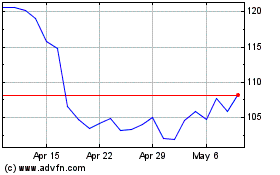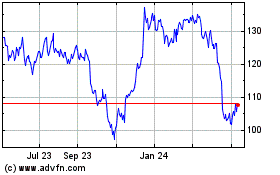E-Commerce Mania Spreads To Warehouse Market
September 26 2017 - 7:29AM
Dow Jones News
By Esther Fung
E-commerce is setting off a scramble for industrial real estate
near urban centers, giving landlords of once-unglamorous properties
a chance to push up rents to record levels.
Amazon.com Inc. and other online retailers, as well as
fulfillment companies such as FedEx Corp., increasingly are seeking
out "last-mile" locations in urban areas to feed consumer demand
for ever-faster delivery of their purchases.
That, in turn, is giving landlords of such facilities pricing
power they have never enjoyed before.
On average, U.S. industrial rents stood at a record $5.35 per
square foot in the second quarter, up from $5.25 in the first
quarter, according to data from real estate services firm JLL.
A well-located last-mile facility "has the functional equivalent
of a high-end retail store," said Hamid Moghadam, chairman and
chief executive officer of industrial real-estate investment trust
Prologis Inc. Such facilities are productive for the tenant and
reduce transportation and labor costs.
But they also are scarce, prompting some landlords to get
creative. Prologis, a San Francisco-based REIT, purchased the old
ABC Carpet building in the Bronx earlier this year to convert to
warehouse space. It expects to get rents in the low-$20 per square
foot, which would be comparable to some office and retail asking
rents in the area.
When a company is shipping to individual customers rather than
in bulk to stores, most of their costs are in transportation and
labor, and reducing them is a priority, said Eric Frankel, an
analyst at real-estate research firm Green Street Advisors.
Warehouse rent, by contrast, represents just 5% or so of costs in a
supply chain.
"If you think about sales productivity across the entire supply
chain, paying a high rent is not a big deal," said Mr. Frankel.
Modest levels of new warehouse supply are coming onto the market
at a time when some e-commerce companies are expanding rapidly.
Amazon is now the largest tenant of Prologis, Duke Realty Corp.,
Jones Lang LaSalle Income Property Trust and DCT Industrial Trust
by percentage of rental revenue at year-end 2016, according to
S&P Global Market Intelligence.
"Consumer purchasing behavior and the rise of e-commerce have
shifted in a way that is extremely beneficial for industrial real
estate. Proximity of warehouses is more important than ever, and we
aim to own properties closest to transportation and consumers,"
said Phil Hawkins, president and chief executive of DCT in a
statement.
Some retailers, meanwhile, are embracing the practice of
"showrooming," in which shoppers use bricks-and-mortar retail
locations to check out goods they later purchase online. Nordstrom
Inc. earlier this month said it is opening a store in West
Hollywood, Calif., where shoppers can try on clothes, but the store
won't carry inventory. Instead, the merchandise would be retrieved
from other nearby Nordstrom locations or through its website.
If the concept becomes more commonplace, it would fuel more
demand for more logistics space and services, analysts said.
Other markets where warehouse space is poised to generate
premium rents include Seattle, San Francisco, parts of Los Angeles,
Chicago and possibly Miami, said Mr. Moghadam, adding that in the
future the company might be able to lease 4 million or 5 million
square feet of such premium space in each location. All told,
Prologis owns about 381 million square feet of space in the
U.S.
Warehouses commanding rents near those of office and retail
space are highly profitable for landlords in part because the
build-outs are cheaper than office or retail spaces, but analysts
said it still remains too early for the emergence of a form of
classification of warehouses akin to the different tiers of malls
in the U.S. as such high-rent deals aren't commonplace.
"It's too small a piece of the portfolio," said Steve Sakwa, an
analyst at Evercore ISI, noting that such leasing deals are still
few and aren't going to redefine Prologis' massive portfolio
anytime soon.
Mr. Sakwa noted that equity investors have already been
assigning higher valuations to industrial REITs, with some of their
stock prices up 30% in the past year.
Write to Esther Fung at esther.fung@wsj.com
(END) Dow Jones Newswires
September 26, 2017 07:14 ET (11:14 GMT)
Copyright (c) 2017 Dow Jones & Company, Inc.
Prologis (NYSE:PLD)
Historical Stock Chart
From Mar 2024 to Apr 2024

Prologis (NYSE:PLD)
Historical Stock Chart
From Apr 2023 to Apr 2024
